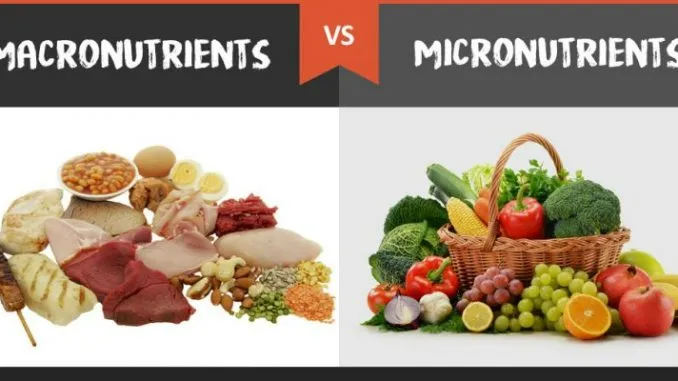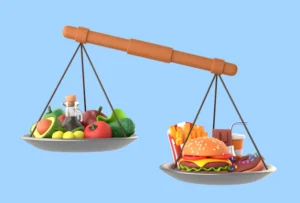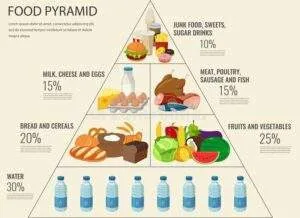
Nutrients are the good things that we get through food which we need to nourish and nurture ourselves, and to be happy and healthy people. In scientific terms, nutrition is the supply of food that we need as an organism to feed our cells and keep them alive. Having good nutrition can help: reduce the risk of different diseases such as diabetes, heart disease, stroke, various types of cancers, and osteoporosis. Good Nutrition also reduces high blood pressure and it can lower high cholesterol.
Why is Nutrition important

Macronutrients are the nutrients your body needs in larger amounts, namely carbohydrates, protein, and fat. These provide your body with energy or calories. Micronutrients are the nutrients your body needs in smaller amounts, which are commonly referred to as vitamins and minerals.
Balancing Micro and Macro Nutrients
A balanced diet includes a variety of foods in adequate amounts and correct proportions to meet the day’s requirements of all essential nutrients such as proteins, carbohydrates, fats, vitamins, minerals, water, and fiber. Such a diet helps to promote and preserve good health and also provides a safety margin or reserve of nutrients to withstand a short duration of deprivation when they are not supplied by the diet.
Impact of unbalanced Diet.

A diet, which disturbs the balance among the body elements, is called an unbalanced diet. A list of diets that contains little amount of all or some of the six food elements is called an unbalanced diet. This diet consists of either an overload or an insufficient intake of any dietary component. That means an overload or shortage of dietary parts, such as – proteins, fat, carbohydrates, fiber, vitamins, and minerals. Too many calories or too few calories are other types of imbalances. Most people in our world have an unbalanced diet. These people mostly eat carbohydrates. The body lacks proper nutrition if the diet does not contain a sufficient number of balanced proteins, carbohydrates, mineral salts, and vitamins. Eating erroneous types of food is the probable reason for a dietary imbalance. While there is no such thing as an ideal diet, striving to preserve balance in your diet can help prevent dietary deficiencies and redundant weight gain. An unbalanced diet can lead to health problems like high blood pressure, obesity, diabetes, tooth decay, coronary heart disease, hypertension, osteoporosis, malnutrition, and osteoarthritis. The deficiency of proper nutrition in the body is known as malnutrition.
An unbalanced diet causes diseases on continued indulgence, e.g.,
- Psychiatric disorders
- Coronary heart disease
- High blood pressure
- Obesity
- Tooth decay.
Reference from: QS study, Star Health Insurance
Generic Healthy eating plan
A healthy eating plan gives your body the nutrients it needs every day while staying within your daily calorie goal for weight loss. A healthy eating plan also will lower your risk for heart disease and other health conditions.
A Healthy Eating Plan
- Emphasizes vegetables, fruits, whole grains, and fat-free or low-fat dairy products
- Includes lean meats, poultry, fish, beans, eggs, and nuts
- Limits saturated and trans fats, sodium, and added sugars
- Controls portion sizes
Food Pyramid

The Food Pyramid is a visual representation of how different foods and drinks contribute to a healthy balanced diet. The Food Pyramid allows individuals the flexibility to choose foods and drinks from each shelf depending on their food preferences.
7 Essential Nutrients and Why Your Body Needs Them
- Protein.
- Carbohydrates
- Fats.
- Vitamins.
- Minerals.
- Fiber
- Water.
Everyone must consume these seven nutrients daily to help them build their bodies and maintain their health.
Daily Intake Levels
The reference values used for the Daily Intake Guide are based on those provided in the Australia New Zealand Food Standards Code (FSC). The FSC has outlined the composition and labelling requirements for food. According to the FSC, a balanced diet for an average adult is made up of the following nutrients each day:
| Nutrient | Quantity Per Day |
| Energy | 8,700 kilojoules |
| Protein | 50 grams |
| Fat | 70 grams |
| Saturated Fatty Acids | 24 grams |
| Carbohydrates | 310 grams |
| Sugars | 90 grams |
| Sodium (salt) | 2.3 grams |
| Dietary Fiber | 30 grams |
Babu says:
8 July 2022Good one